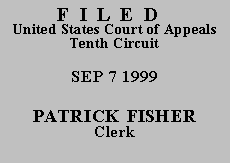

| UNITED STATES OF AMERICA,
Plaintiff-Appellee, Defendant-Appellant. |
No. 98-1459
(D.C. No. 94-CR-414-M) (Colorado) |
Ruben DeSantiago-Flores was convicted of drug charges. In this post- conviction motion, he claims that seized funds in the form of a "certificate of deposit," also referred to as a "cashier's check," should be returned to him. The district court denied the motion, holding that the funds were seized under a proper administrative forfeiture of the check. We affirm.
On March 17, 1994, officers searched Mr. DeSantiago's residence as part of an investigation of a drug conspiracy. Along with other items, a cashier's check for $16,218.00 was seized. The government stated that a notice of forfeiture was sent to Mr. DeSantiago's residence through certified mail, return receipt, on April 25, 1994, prior to Mr. DeSantiago's confinement. The government also stated that it published the forfeiture in USA Today. No claim was received for the money, and it was forfeited to the government on July 1, 1994.(1) Mr. DeSantiago, pro se, made a motion under Fed.R.Crim.P. 41(e) to challenge the forfeiture. The district court denied the motion and Mr. DeSantiago now appeals on two grounds: he asserts first that the government failed to prove a nexus between the seized property and the illegal drug conduct, and second that the seizure was an unconstitutional application of the law of capture.
We construe the pleadings and papers of a pro se appellant liberally. See Haines v. Kerner, 404 U.S. 519, 520-21 (1972) (per curiam). We review a district court's denial of a motion for return of property under Rule 41(e) for an abuse of discretion. See United States v. Deninno, 103 F.3d 82, 84 (10th Cir. 1996). We review due process as a matter of law de novo, but review whether the government's conduct was reasonably calculated to provide actual notice of forfeiture for clear error. See United States v. Clark, 84 F.3d 378, 380 (10th Cir. 1996).
We have held that where the property sought to be returned has been administratively forfeited, the Court should not exercise Rule 41(e) jurisdiction if the movant has failed to challenge the forfeiture through the appropriate administrative and judicial procedures. However, federal question jurisdiction pursuant to 28 U.S.C. § 1331 is available for the limited purpose of considering collateral due process attacks . . . . If an administrative forfeiture does not have any procedural defects, other challenges to the forfeiture, which could have been addressed under the statutory and regulatory procedures, must be considered waived.
See Deninno, 103 F.3d at 84-85 (citations omitted).
We understand Mr. DeSantiago's first argument to be that the government has not proved the seized property had any connection to illegal activities. This issue, however, is not one we reach because Mr. DeSantiago has not shown that the procedures for the administrative forfeiture, such as adequate notice, were defective. See id at 84 (failure to contest administrative proceedings constitutes waiver); Clark, 84 F.3d at 381 (same). The district court concluded that the forfeiture proceeding was proper. Absent evidence to the contrary offered by Mr. DeSantiago, we cannot say the district court erred.
Mr. DeSantiago's second argument that administrative forfeiture pursuant to 21 U.S.C. § 881 is unconstitutional per se as a remnant of the law of capture was not raised below. Although we believe the argument to be meritless, we decline to address it. See City of Stillwell v. Ozarks Rural Elect. Coop. Corp., 166 F.3d 1064, 1073 (10th Cir. 1999) (declining to consider an issue not raised below).
We AFFIRM.
ENTERED FOR THE COURT
Stephanie K. Seymour
Chief Judge
*.This order and judgment is not binding precedent, except under the doctrines of law of the case, res judicata, or collateral estoppel. The court generally disfavors the citation of orders and judgments; nevertheless, an order and judgment may be cited under the terms and conditions of 10th Cir. R. 36.3.
1.In November 1995, Mr. DeSantiago wrote to the government inquiring about the money. Concurrently, he filed a motion to vacate his sentence on grounds that a forfeiture and a conviction constituted double jeopardy. The district court denied the motion on December 22, 1995.